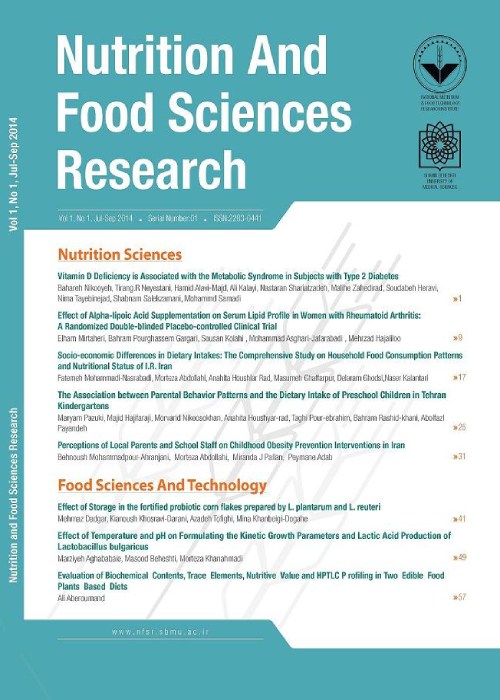Association of Self-efficacy and Decisional Balance with Stages of Change for Fiber Intake and Glycemic Control in Patients with Type 2 Diabetes
Author(s):
Abstract:
Background And Objectives
Constructs of behavioral models such as trans-theoretical model can be associated with healthy eating behaviors like increasing fiber intake. They can also be effective in improving these behaviors in patients with diabetes. This study aimed to assess the association of self-efficacy and decisional balance with stages of change for fiber intake and glycemic control in patients with type 2 diabetes.Materials And Methods
A cross-sectional study was conducted on 145 literate male and female patients with type 2 diabetes (aged 30 to 65 years); they were randomly selected from the patients’ list of “Charity Foundation for Special Diseases” and”Iranian Diabetes Society” in Tehran-Iran. Stages of change, self-efficacy, and decisional balance questionnaires were filled out, and three food records were used to assess their nutritional status. Blood samples were taken to assess fasting blood glucose, HbA1c, serum insulin, and insulin resistance. One-way ANOVA and logistic regression were used to analyze the data. The tests were done using the SPSS software (ver. 16). P<0.05 was considered significant.Results
126 patients with type 2 diabetes completed the study. Participants’ mean age was 53.5±6.02 and 65% were men. Patients in post-action stages revealed higher self-efficacy than did those in pre-action stages (P=0.035). A relationship was observed between insulin resistance and self-efficacy (P=0.040). One unit increase in self-efficacy decreased the risk of insulin resistance by 12%, and each unit increase in decisional balance increased the chance of eating sufficient fiber by 2.2 times. There was also a significant relationship between the perceived cons (P<0.0001) and self-efficacy (P=0.037) with fiber intake after adjustment with confounders.Conclusions
This study suggests that there is a relationship between transtheoretical model constructs such as self-efficacy and decisional balance, especially cons, with fiber intake in patients with type 2 diabetes. So it seems that considering these constructs in educational interventions could be effective in increasing the fiber intake in such population.Language:
English
Published:
Nutrition & Food Technology Research, Volume:2 Issue: 4, Oct-Dec 2015
Pages:
11 to 20
magiran.com/p1461520
دانلود و مطالعه متن این مقاله با یکی از روشهای زیر امکان پذیر است:
اشتراک شخصی
با عضویت و پرداخت آنلاین حق اشتراک یکساله به مبلغ 1,390,000ريال میتوانید 70 عنوان مطلب دانلود کنید!
اشتراک سازمانی
به کتابخانه دانشگاه یا محل کار خود پیشنهاد کنید تا اشتراک سازمانی این پایگاه را برای دسترسی نامحدود همه کاربران به متن مطالب تهیه نمایند!
توجه!
- حق عضویت دریافتی صرف حمایت از نشریات عضو و نگهداری، تکمیل و توسعه مگیران میشود.
- پرداخت حق اشتراک و دانلود مقالات اجازه بازنشر آن در سایر رسانههای چاپی و دیجیتال را به کاربر نمیدهد.
In order to view content subscription is required
Personal subscription
Subscribe magiran.com for 70 € euros via PayPal and download 70 articles during a year.
Organization subscription
Please contact us to subscribe your university or library for unlimited access!


